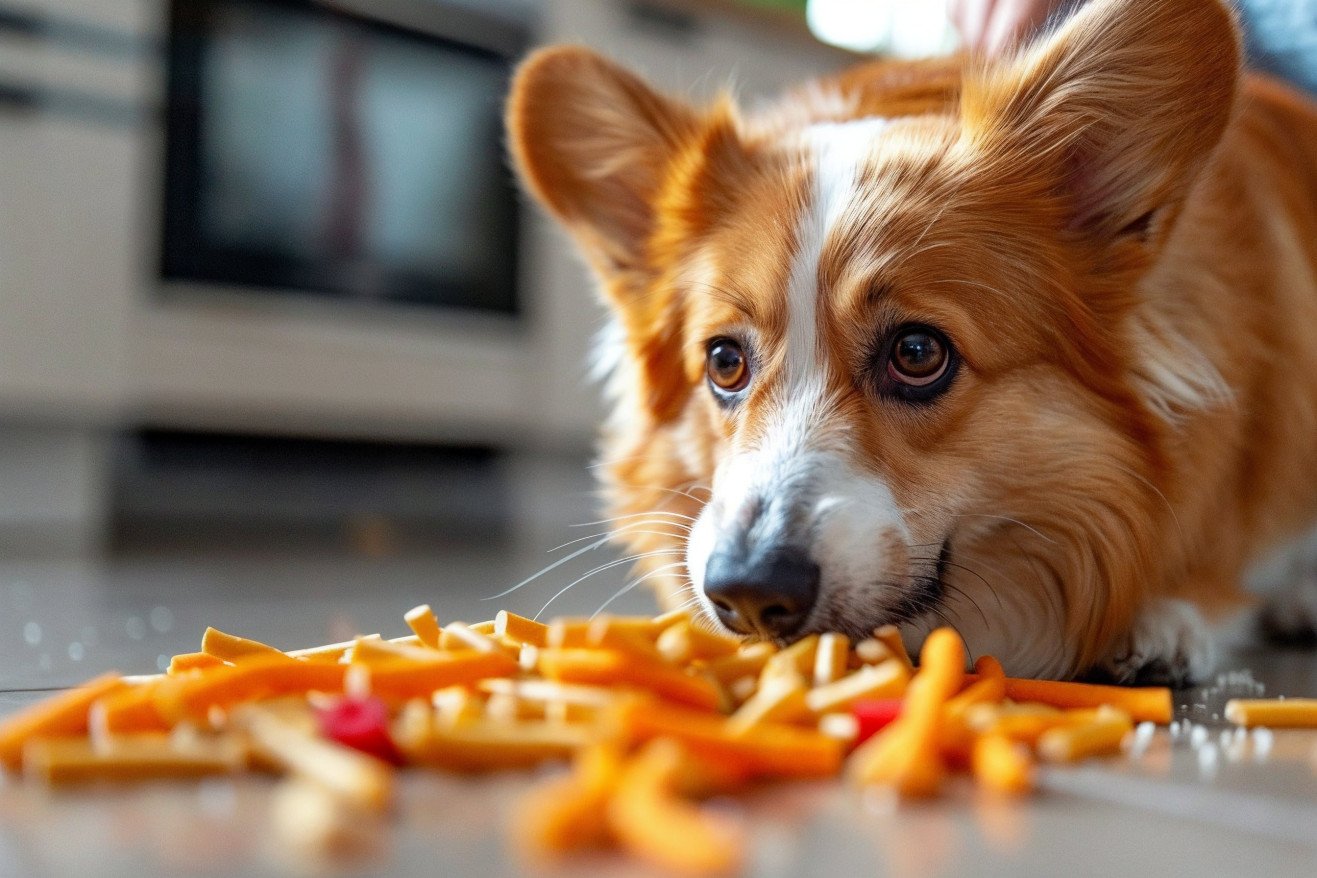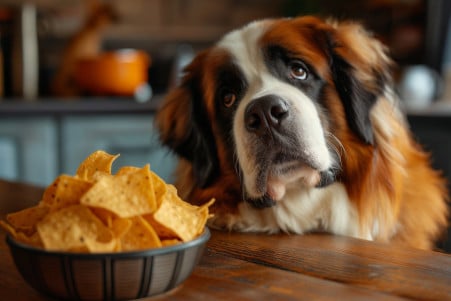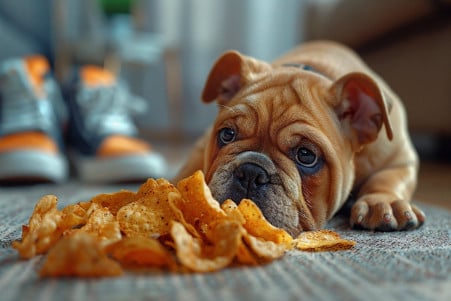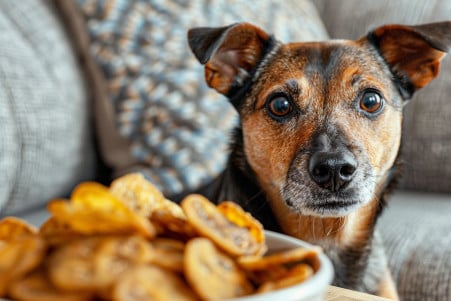Can Dogs Eat Veggie Straws? Insights from Vets and Nutritionists
30 March 2024 • Updated 29 March 2024

Veggie straws may appear to be a nutritious snack, but their high sodium, fat, and preservative levels make them a less-than-ideal choice for dogs. While dogs can have a few plain veggie straws, it's important to choose low-sodium, baked options that don't contain any oils or seasonings. Consuming too many veggie straws can lead to tummy troubles, dehydration, and weight gain in dogs.
To help you better understand whether or not you should feed your dog veggie straws, this article will explore information from veterinary nutritionists and other experts in dog nutrition. This includes studies that have looked at the anatomy of a dog's gut, the best nutritional profiles for different dogs based on their breed and life stage, and how to tell if your dog is having a bad reaction to something they ate. This knowledge will help you make better decisions about how to safely feed your dog veggie straws and other human food.
Can dogs eat veggie straws?
Nutritional Composition of Veggie Straws
Veggie straws are made mostly from potato and corn starches, with very little actual vegetable content. While they may contain trace amounts of ingredients like tomato paste, spinach powder, and beetroot powder, these are in such small amounts compared to the starches that they are negligible, according to Can Dogs Eat Veggie Straws? Safe Snack Tips.
They are also high in fat, sodium, and a number of other additives and preservatives. The same site points out that veggie straws can contain more than 7 grams of fat and 220 milligrams of sodium per serving, as well as potassium chloride, turmeric, sunflower oil, and canola oil. In fact, for a 33-pound dog, one serving provides half the recommended daily fat intake and more than 100% of the recommended daily sodium intake, according to Can Dogs Eat Veggie Straws? Unveiling the Canine Snacking Dilemma.
The processing methods used to make veggie straws also mean they are low in nutritional value. According to Healthy Homemade Dog Treats, when potatoes are pulverized into a powder, they lose their vitamins and minerals, leaving behind only carbohydrates, sodium, fats, and additives. The same is true for the corn, which loses its natural nutritional content when it is processed into veggie straws.
While potatoes and corn are safe for dogs in moderation when they are fed in their whole, unprocessed states, the processed and fried nature of veggie straws makes them unhealthy. By removing the nutritional content and adding unhealthy fats, salt, and artificial ingredients, veggie straws become a nutritionally void snack that could potentially harm a dog.
Healthier Dog Snack Options
There are many fruits and vegetables that are safe and healthy for dogs to eat as snacks. The American Kennel Club lists apples, bananas, broccoli, carrots, green beans, peas, spinach, and sweet potatoes as some of the best options. These vegetables can provide dogs with important nutrients, fiber, and antioxidants.
Forbes Advisor notes that vegetables should be washed, have stems and seeds removed, and be cut into bite-sized pieces. They should also only make up 10% of a dog's daily caloric intake, with the other 90% coming from a nutritionally complete dog food.
Raw Bistro even offers tips on how to prepare vegetables for dogs, including blanching, steaming, or pureeing them, to make sure they're easier to digest and retain more of their nutrients. This way, dog owners can give their pets a healthier, more natural option than veggie straws by adding more whole foods to their diet.
Recipes for Homemade Vegetable Dog Treats
For dog owners who want to give their pets the benefits of vegetable dog treats, making your own is a great option. As shown by Damn Delicious, it's easy to make treats like spinach, carrot, and zucchini dog treats at home. These treats are often made with healthy, whole foods like vegetables, whole grains, and peanut butter.
It Doesn't Taste Like Chicken has a recipe for peanut butter and carrot dog treats, and Wife Mama Foodie has a recipe for healthy veggie dog biscuits. Making your own treats gives you control over the ingredients and lets you avoid the unhealthy additives that are often included in store-bought treats.
In addition, making your own treats can be an affordable way to give your dog the gift of healthy, delicious treats. As Lifestyle Changes One Bite At A Time points out, these homemade vegetable dog treats are quick to make and don't have the high oil and salt content of many store-bought treats.
Baked Veggie Chips: A Better Option?
Baked veggie chips are often marketed as a healthier alternative to traditional potato chips or veggie straws. However, as Therapy Pets Unlimited points out, while baked chips may have less fat and sodium, they are still processed and have little nutritional value. The high heat used to bake the chips can also destroy the nutrients in the vegetables.
Moreover, Pooch & Mutt observes that baked veggie chips can have added oils, flavorings, and preservatives that are toxic to dogs. While a small amount of plain, baked veggie chips as an occasional treat is unlikely to be dangerous, they should not be a regular part of a dog's diet. Like veggie straws, the processed nature of baked veggie chips means they don't have the same nutritional value as whole, fresh vegetables.
Conclusion: Moderation and Supervision are Key
Dogs can eat plain veggie straws in moderation, but because of their high salt, fat, and preservative content, they are not recommended. Instead, dogs can eat fresh fruits and vegetables, homemade treats made from vegetables, and in some cases, small amounts of plain, baked veggie chips.
It's important to watch dogs carefully for signs of food intolerance or toxicity when introducing new treats or snacks. A veterinary nutritionist can also help you determine how to safely add healthy snacks to your dog's diet. However, it's important to remember that a dog's diet should be based on a high-quality, nutritionally complete dog food that meets their specific nutritional needs.


